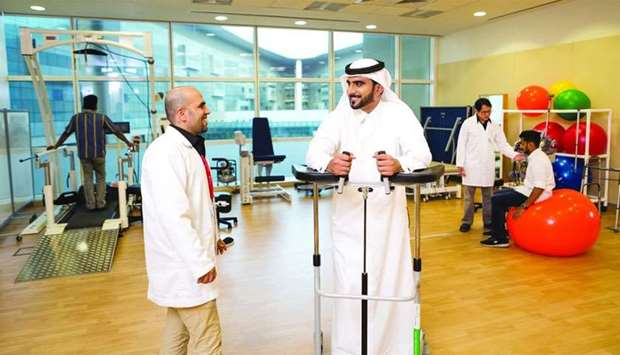Two years after welcoming its first outpatients, Hamad Medical Corporation's Qatar Rehabilitation Institute (QRI) has cared for over 80,000 patients at its various clinics.
The specialist rehabilitation hospital provides cutting-edge services to children and adults in need of rehabilitative care due to conditions caused by injury, disease, illness, and ageing.
"We provide high-quality compassionate care to patients who have suffered a stroke, traumatic brain injury, spinal cord injury, as well as those with a variety of conditions that cause physical pain.
Our operations span five rehabilitative programs and have been very successful," Chairperson of Rehabilitation at QRI, Dr Wafa al-Yazeedi said.
According to Dr al-Yazeedi, QRI provides general rehabilitation services comprising inpatient care, day care, outpatient and paediatric clinics, speech therapy, occupational therapy, and physical therapy, as well as community-based rehabilitation.
The first of its kind in the region, the specialist facility has over 150 staff, including physicians, nurses, and occupational, physical, pediatric, and speech therapists who each hold advanced certification in diverse clinical specialties, ranging from orthopedics to geriatrics.
The facility has seven hydrotherapy pools, 11 advanced gyms, a specialist sensory room, and an assisted living unit in which patients can relearn daily tasks and readjust to life at home.
Dr al-Yazeedi said, in 2018 a number of new services were launched at the QRI, including assistive technology services (sponsored by the Qatar Assistive Technology Centre-Mada) and a supervised gymnasium.
"Assistive technology is helping our patients to improve their communication and functional skills through the use of specialised technologies, while the supervised gym has helped to empower them to be more independent and confident through exercising, which is recommended as follow-up therapy after they have completed their outpatient services and are ready for discharge," Dr al-Yazeedi explained.
Dr al-Yazeedi added that physical exercise is important for patients after they are discharged from rehabilitative care in order to ensure continued improvement of their condition and early detection of any signs of deterioration that could cause complications.
Dr al-Yazeedi further said that there are plans for the addition of a number of new services, including an expansion of the existing stroke rehabilitation programme, the commissioning of new services for pediatric patients, and the launching of Easy Street, a rehabilitation programme which helps patients practice the skills they need for independent living.
"At QRI, we are working in line with the provision of the National Health Strategy 2018-2022 to ensure health and well-being for people with special needs or disabilities by giving them access to high-quality care. The NHS 2 recognises that disability is a public health challenge and people with disabilities face barriers in accessing health and related services, such as rehabilitation.
"We have helped all our patients overcome these barriers as our existing programs and services are easily accessible by patients and are made up of clinical and therapy services which are selected and adapted according to each patient's needs by our interdisciplinary team of clinicians and therapists," Dr al-Yazeedi noted.
"We hope to continue this trend with our new services and ensure our clinicians and therapists work together to develop a personalised programme of care for each of our patients according to their individual rehabilitation requirements," Dr al-Yazeedi concluded.

